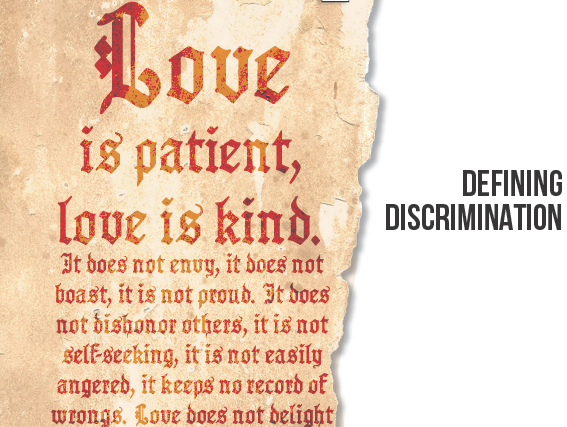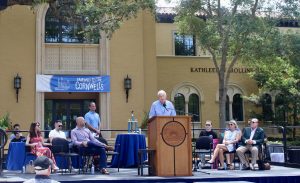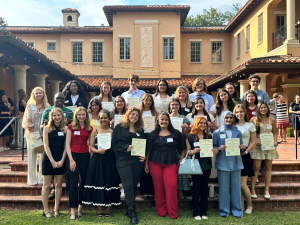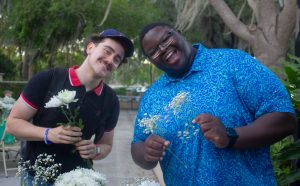[information]Read the perspectives of both students involved here.[/information]
Towards the beginning of last semester, InterVarsity Christian Fellowship asked a Rollins student to step down from co-leading a campus Bible study group, citing a disagreement over biblical authority and human sexuality.
Rollins subsequently derecognized InterVarsity as a campus organization for violating the school’s nondiscrimination policy. The blogosphere and popular media proceeded to erupt with reports that Rollins had banned the evangelical Christian campus ministry for requiring that its leaders follow InterVarsity’s interpretation of Christian doctrine.
But according to Grace Loescher ‘14, the student involved in the incident, it was her commitment in a same-sex relationship, not her Christian credentials, which prompted her dismissal.
Kim Koi, Central Florida area InterVarsity director, and Steve Wimmer, an InterVarsity staff member, said InterVarsity has an open policy, meaning that anyone is welcome to join the group, but leaders must affirm that they adhere to the beliefs of the organization. Because of Loescher’s refusal to end her relationship, the two InterVarsity staff members that guide the Rollins InterVarsity chapter made the decision to ban her from leadership.
A week later, Loescher sent Koi and Wimmer an email stating, “I am truly heartbroken that I am no longer welcome to share my love and deepening understanding of the Bible with my friends in InterVarsity. While you may believe that you have fulfilled your Christian duty by offering to allow me to remain in the organization, I can assure that you can’t discriminate in increments.”
The blogosphere and popular media proceeded to erupt with reports that Rollins had banned the evangelical Christian campus ministry for requiring that its leaders follow InterVarsity’s interpretation of Christian doctrine.
In September, Loescher attended an InterVarsity core meeting to inform members of what happened and why she was leaving the group. “I pretty much said, hey guys, this is what happened. I was asked to step down because I’m in a same-sex relationship. I don’t know if you guys know [about this policy], because I didn’t, and I want you to be aware of what you’re standing for.”
After her talk, Loescher walked out of the room. She looked back, expecting someone to get up and walk away with her, but nobody did. “That was one of the most hurtful moments of the whole experience,” she said.
The news quickly made its way up to administration level. The administration decided that InterVarsity was in violation of the college’s nondiscrimination policy, which reads, “It is the policy of Rollins College not to discriminate on the basis of sex, disability, race, age, religion, color, national or ethnic origin, ancestry, marital status, veteran status, sexual orientation, gender identity, gender expression, genetic information, physical characteristics, or any other category protected by federal, state, or local law, in its educational programs, admissions policies, financial aid, employment, or other school-administered programs.”
Rollins College President Lewis Duncan said, “[InterVarsity] cannot be an official Rollins organization if they do not abide by the institution’s nondiscrimination policy. That doesn’t apply just to them. It applies to every other organization and official Rollins’ activity on campus.”
Because InterVarsity refused to comply with the nondiscrimination policy, Duncan made the decision to derecognize InterVarsity as a Rollins organization in the last week of September 2012. An organization that has been derecognized by Rollins is still be able to meet, but it can no longer receive Rollins funds, use Rollins’ publicity, or formally reserve meeting spaces on campus. InterVarsity was temporarily allowed to operate under the authority of the chapel, but the administration soon reversed that decision.
Duncan emphasized that the Board of Trustees had approved the nondiscrimination policy, and therefore, it was up to them as whether to make an exception for InterVarsity. He invited InterVarsity to apply to the Board of Trustees for an exception from the nondiscrimination policy, which they did in December.
InterVarsity’s proposal stated that “true diversity on campus means incorporating a plurality of faiths, as well as creating space for adherents to those faiths to meet in safe and supportive environments.”
InterVarsity President Zach Baldwin said, “a religious organization should be allowed to use religious criteria to determine their leadership.” He expressed concern about what implications the nondiscrimination policy would have for other religious groups on campus. Fiat Lux (self-described as the “Christian Crusade for Christ”) had also rejected to follow the policy and was therefore derecognized by Rollins as well.*
According to Duncan, the Board of Trustees formed a committee task force to investigate InterVarsity’s proposal. The task force collected legal opinions, case studies, and encouraged written submissions from InterVarsity. They also looked at how other schools had handled similar situations, for InterVarsity has been de- certified by other colleges in the past.
Duncan said, “There’s been some schools that have reviewed this and granted the exception, primarily large public schools, and there have been a number of schools that have not granted the exception. Those tend to be more private schools, such as Vanderbilt, which is [a case] we looked at closely. The only private school that was on our list of those that had granted the exception in the last couple of years was Tufts University . . . where the exception had been granted by a student-faculty committee, not the Board of Trustees.”
The trustee task force reported to the full board, which met in February. They voted not to grant InterVarsity an exemption from the college’s nondiscrimination policy.
Greg Jao, InterVarsity’s national field director, told Fox News that Rollins College is sending an ominous message to Christians – “Their actions suggest if you have strongly held religious beliefs – you are not welcome on the campus – particularly if you have any intention of living them out,” Jao said. “It suggests religion is an impermissible or a disfavored category that’s not worthy of the same protections as gender or sexual orientation.”
As previously mentioned, the board’s decision has since made many media headlines. However, Duncan notes that “it’s not nearly the story that it’s presented to be by the outside press.”
Fox 35 News and the Orlando Sentinel, for example, have presented the decision as a suppression of Christianity, minimizing the issues of discrimination that are at the core of the matter.
As for the future of InterVarsity, Baldwin said, “We’re still trying to figure out what evangelical students can do as far as [participating in] Bible studies. I have spent almost three years on campus and being a spiritual resource for them, and I plan to continue to do that as an individual.”
Despite all of the surrounding disagreement and controversy, Loescher and Baldwin remain good friends. As Duncan has observed, “This is a case where the outside influences are much more rigid than the inside people . . . It’s unfortunate that this gets cast sometimes as the way that it does, but I am very pleased about where Rollins has ended up. We are standing very strongly for the right for students to question and not have to adhere to oaths of belief allegiance in order to participate or even lead in those discussions.”
[information]An open discussion on the campus controversy will take place Monday, March 25 at 5 p.m. in the Galloway room located in the Mills Building.[/information]
*Editor’s Note: According to both Director of Public Affairs Lauren Bradley and the Office of Student Involvement and Leadership, Fiat Lux was not derecognized and is still an active organization.












[…] Defining discrimination: The rumors and realities behind the derecognition of InterVarsity […]